|
| Home | About Kashmir Herald | |
Volume 3, No. 10 - March-April 2004 |
|
| Featured Article |
|
|
|
J&K: Elections, Again Praveen Swami Campaign 2004 has already claimed its first life. On March 18, Mukhtar Ahmad Bhat went for a walk near his Srinagar home. A police van brought his body back late that evening. Security force officials in Jammu and Kashmir (J&K) are hoping the assassination isn't a sign of things to come - and are asking for some 56,000 additional troops to make sure their worst fears aren't realised. No one is certain just who killed Bhat, a one-time terrorist who renounced violence and joined the youth wing of the Janata Dal (United). His killing, however, comes in the context of a wave of terrorist attacks on mainstream politicians and their families. Two days before Bhat's killing, terrorists executed a grenade attack on the home of the daughter of the Kulgam Member of the Legislative Assembly (MLA) and Communist Party of India (CPI) leader, Mohammad Yusuf Tarigami. A People's Democratic Party activist, Ghulam Hassan, and a former MLA, also named Ghulam Hassan, were targeted on the same day. Soon after, terrorists ambushed former Jammu and Kashmir Minister and National Conference leader Abdul Rahim Rather. For politicians in J&K, such violence is routine. The 2002 Assembly elections, hailed across India as free and fair, cost the lives of 41 political workers in the month of September alone. The bulk of the victims were members of the National Conference, targeted by the Islamist right in an effort to bring down the party they saw as their principal enemy. In all, 99 political workers died in 2002. 1999, the year of the last Lok Sabha (Lower House of Parliament) elections, saw the deaths of 49 political workers; 1998, the year of the previous Lok Sabha elections, saw 41 killed; 1996, the year of the previous Assembly elections, saw 69 such deaths. The numbers indicate just how violent the 2002 elections were, notwithstanding ill-informed but widespread claims that the massive Indian military build-up that began the previous year had coerced Pakistan into deescalating support for the terrorists' anti-election campaign. Despite considerable media hype about recent and dramatic acts of terrorism, however, figures compiled by the Union Ministry of Home Affairs show that violence has been declining since 2002. Combat fatalities peaked in September last year, true to the regular seasonal cycle of violence in J&K, and have since been in steady decline. Military officials, however, have warned New Delhi that the elections will be taking place in the summer, when Pakistan could lift restraints on cross-border infiltration, allowing terrorist groups to replenish their cadres. Although few security experts take the J&K Government's demands for enormous numbers of additional troops at face-value, most agree that some additional forces will have to be found to secure the State as elections approach. Interestingly, February 2004 saw a marginal increase in violence compared with the same month of 2003. There were 60 attacks on security forces last month, compared with 53 in February 2003. 183 people died in terrorism-related violence, compared with 126 the previous year - although this was partly the result of killings of terrorists by security forces, which stood at 86, in February 2004, compared with 71 in February 2003. It is, of course, hard to draw conclusions from these figures, although they do, at face value, seem to suggest that the escalatory cycle that begins in J&K each spring has set in again. Indian intelligence officials also note that wireless stations operating from terror camps across the Line of Control have been telling their operatives to step up efforts to escalate violence during the election process. Election-time violence will confront Indian security forces with a dilemma: whether to allow voters to be coerced into staying away from the elections, or to use troops to encourage polling, and attract charges of counter-coercion. During the 2002 elections to the J&K Assembly, politicians proved only too willing to engage in coercion and counter-coercion. Posters were put up in several parts of southern Kashmir by the Hizb-ul-Mujaheddin (HM), for example, asking voters to oppose the National Conference. In areas like the Mendhar and Surankote Tehsils (administrative unit) in Poonch, for example, various terrorist groups used their leverage to block voters from the Gujjar community from exercising their franchise, and to aide candidates from specific villages. Last year, senior South Kashmir-based People's Democratic Party leader Abdul Aziz Zargar was even accused by the National Conference of having recruited Lashkar-e-Taiba (LeT) terrorist to target the campaign of his rival, Sakina Itoo. The allegations followed claims made by an arrested LeT terrorist that Zargar's village home was used to plan a terrorist attack on the famous Akshardham temple in Gandhinagar, the capital of Gujarat. Pakistan, of course, has good reason to allow - or even encourage - terrorists to proceed with their anti-election coercion. For all the apparent India-Pakistan bonhomie, broadcast ably by politicians on both sides during the ongoing cricket series, Pakistani strategic planners seem nervous about losing political leverage within J&K. Members of the Abbas Ansari-led centrist faction of the All Parties Hurriyat Conference (APHC) met India's Deputy Prime Minister, L.K. Advani, on March 27, and Pakistan has made no secret of its displeasure at this event. Significantly, this faction of the APHC has now indicated that it would not call for a boycott of the elections, as it has done for each of the elections in the past. Pakistan has clearly rejected this faction's credentials, and has put its weight behind the hardline Syed Ali Shah Geelani-led splinter as the 'sole representative' of the people of Kashmir. The Pakistan High Commission in New Delhi described the anti-talks Islamist, Geelani, as the 'Hurriyat chairman' in its invitation for the Pakistan Day celebrations here on March 23; centrist leaders like Ansari, Abdul Gani Bhat, Mirwaiz Omar Farooq and Bilal Gani Lone were referred to only as 'Kashmiri leaders.' What Pakistan chooses to do, of course, depends on just how much pressure the international community is actually able to bring to bear on it. It is at least possible that the recent institutional encouragement offered to Pakistan by the United States of America could translate into a more aggressive posture on J&K. Courtesy: South Asia Terrorism Portal |
 |
 |
 |
|
|
Archives
| Privacy Policy |
Copyrights
|
Contact
Us | |
||